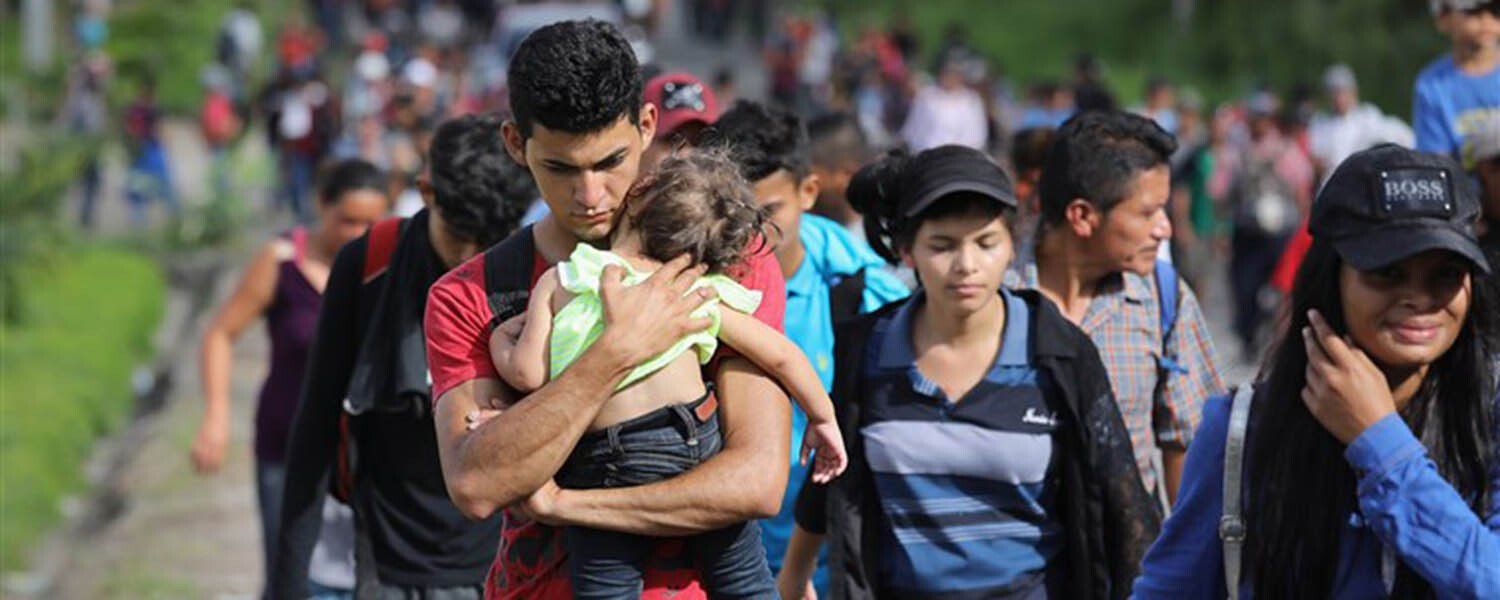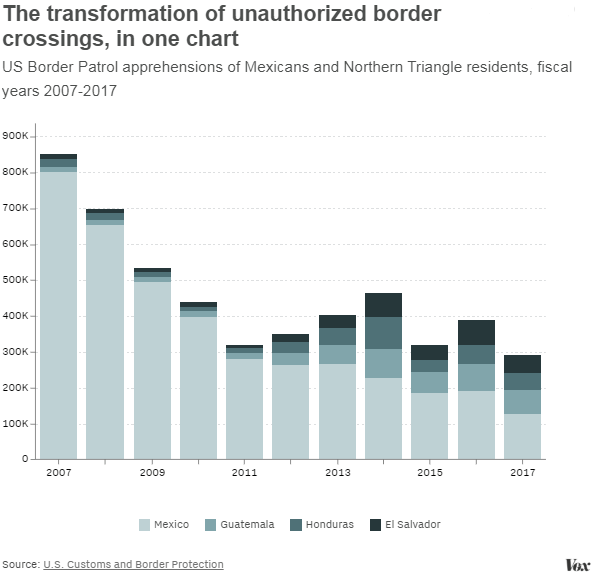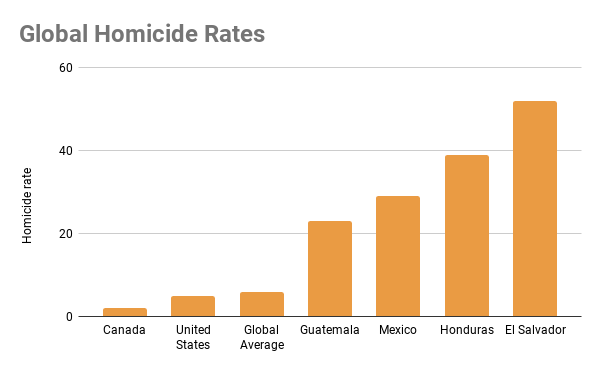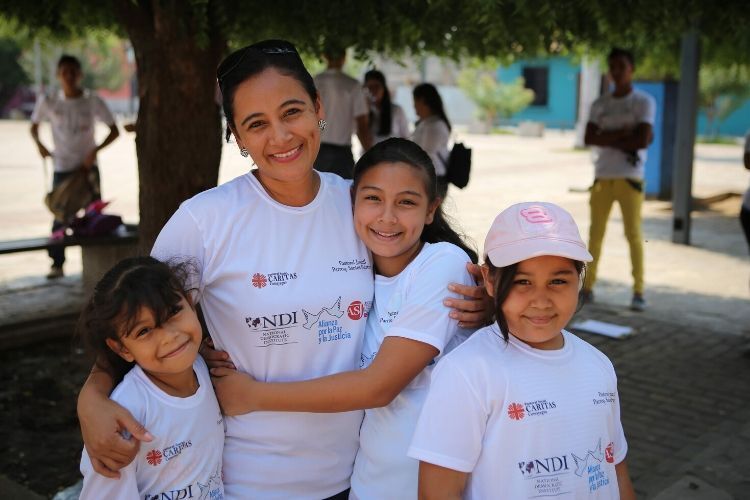Why are Hondurans Immigrating?
In recent years, immigration has dominated headlines in North America. Thousands of Central Americans have made their way to the U.S. southern border in caravans, and constant changes to immigration policy have made it an increasingly politicized issue.
Central American migration is nothing new. In fact, immigration numbers have dropped in half over the past decade. As you can see in this graph from Vox, the overall number of immigrants coming to the U.S. have more than halved, although now a larger portion are coming from Honduras, Guatemala, and El Salvador.
What is causing so many Hondurans and Central Americans to migrate? For many, low wages, lack of jobs, and persistent poverty push them to immigrate. Over 48% of Honduras’ population lives in poverty, leaving many without the resources necessary to provide for their families and causing them to search for a better life elsewhere. But beyond economic factors, the prevalence of violence and corruption in Honduras threatens lives and livelihoods and contributes to the many people leaving behind their homes.
Violence
In recent years, Honduras, Guatemala, and El Salvador have faced “unprecedented levels of violence.” In 2011, Honduras had a homicide rate of 86.5 per 100,000 people, making it one of the most violent places in the world. In contrast, this was 18 times higher than the homicide rate in the U.S. at the time. Though homicides in Honduras are now half of what they were in 2011, the murder rate is still significantly higher than other countries around the world.
Beyond the murder rate, crime is also commonplace in Honduras. Robbery, gang violence, extortion, and assault are daily realities for many, especially those living in Honduras’ poor urban neighborhoods. According to a Doctors without Borders survey, 57% of Honduran migrants reported that they never felt safe while at home.
Homicide Rates per 100,000 residents. Data from the World Bank 2018
Violence infiltrates every part of society, leaving a noticeable impact on Hondurans’ everyday lives. High rates of violence can mean that it’s too dangerous for children to play outside or for families to go out at night. People aren’t safe from assault or robbery during their daily commute. Violent gangs frequently target businesses, extorting a “tax” under threat of violence, which robs the small profits people might have earned. And for vulnerable groups like journalists or the LGBT community, this threat of violence is particularly dangerous.
Violence destroys social connection and opportunities for improvement, especially for the poor. As Gary Haugen points out in The Locust Effect:
“Efforts to end global poverty and to secure the most basic human rights for the poor are failing because crime and violence against the poor are not being addressed.”
Not only do Hondurans face high levels of violence, but it’s also unlikely that they will ever see justice for those crimes. Honduras has an impunity rate of 87%, meaning that the majority of people who commit a crime will never be convicted in court. Seventy-six percent of homicide cases are never even tried, leaving a backlog of more than 180,000 cases in the Honduran courts. When crimes easily go unpunished, it allows criminals to walk freely and perpetuates Honduras’s violence. And it leaves people feeling unprotected and vulnerable to crime.
Honduras’s violence ends up pushing many people to feel like they have no option but to leave for their safety and that of their children.
Corruption
According to Transparency International, corruption is the intentional misuse of public resources for personal gain. Honduras has one of the highest rates of corruption in the world, ranking in the 2020 Corruption Perceptions Index as 157 out of 180 countries, with a score of 24/100 (with 0 being highly corrupt and 100 being highly transparent). Over the past few years, Honduras’ Corruption Perceptions Index has gotten worse, showing Hondurans’ deteriorating confidence in political leadership and institutions.
When corruption happens in Honduras’ already weak institutions, it ends up preventing Hondurans from having access to basic services: it means that public hospitals have no medications to treat sick patients, children don’t have teachers, and government officials charged with protecting their citizens hurt them instead. Even though corruption happens at the hands of those in power, it ends up primarily hurting poor Hondurans.
When governments buy poor-quality medicine at an inflated price, it hurts the people who depend on government pharmacies. When the government doesn’t keep track of where its teachers are, it holds children back from getting a good education or achieving what they could. When public purchasing favors politically-motivated and overpriced contracts, poor Hondurans are the ones who have to pay.
The failure of the government to provide basic services ends up deepening social problems and poverty, leaving people without hope that they can improve their future.
How Can We Address Immigration?
We believe that Hondurans shouldn’t have to immigrate in order to live a life full of security, peace, and the ability to provide for their families. By addressing violence and corruption as root causes of migration, we are able to be part of constructing a better future for Honduras.
ASJ has already made progress in fighting injustice throughout Honduras through our work in investigating homicides in communities and advocating nationally against the persistence of corruption. Honduras’s homicide rate has dropped in half over the past decade. We are bringing to light more and more cases of corruption, such as the use of public funds for political purposes and high-level drug traffickers being extradited to the U.S. And since becoming the national chapter of Transparency International, ASJ has worked to evaluate government ministries and seen an average improvement of 33% in areas of purchasing, human resources, and reliability.
Despite these successes in fighting violence and corruption, many Hondurans are still choosing to immigrate. For some, the persistence of poverty and lack of economic opportunities pushes them to take immediate action to improve their lives. And for others, violence and corruption are still everyday realities. Even though statistics show that violence has reduced, most people still don’t feel safe. While government corruption is being called out, people are still afraid to trust public systems. Strengthening Honduras’ systems will, in fact, take years, but it is work that will prove to make Honduras a safer place.
This work requires standing up against powerful forces, a daunting and dangerous task, and one that won’t happen overnight. Our staff in Honduras are bravely working towards making Honduras’ systems work to serve the poorest and most vulnerable in the country to build a brighter future for Honduras.
Read our reflection on the October 2018 migrant caravan and the March 2019 decision to cut foreign aid to Honduras, or learn more about how we’re working to create a more just society in our work against violence and corruption.
Updated April 2020












